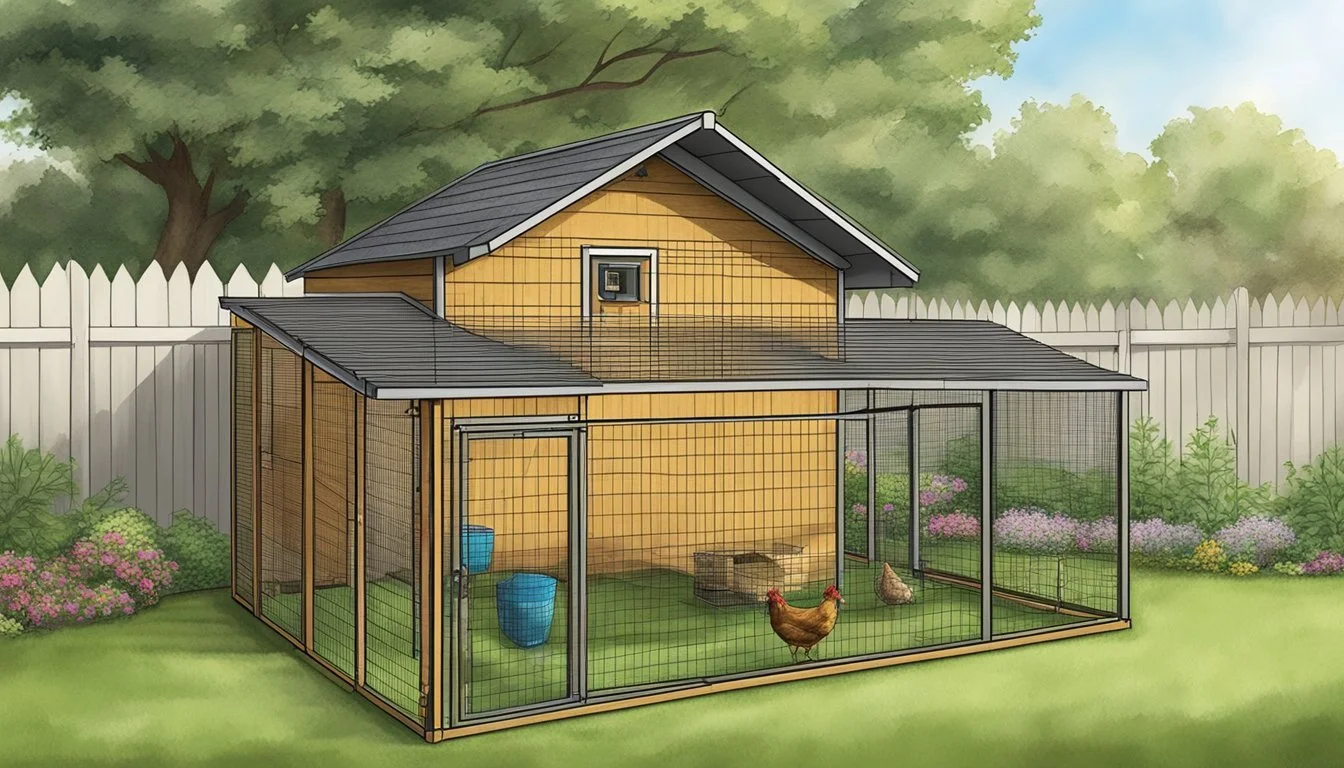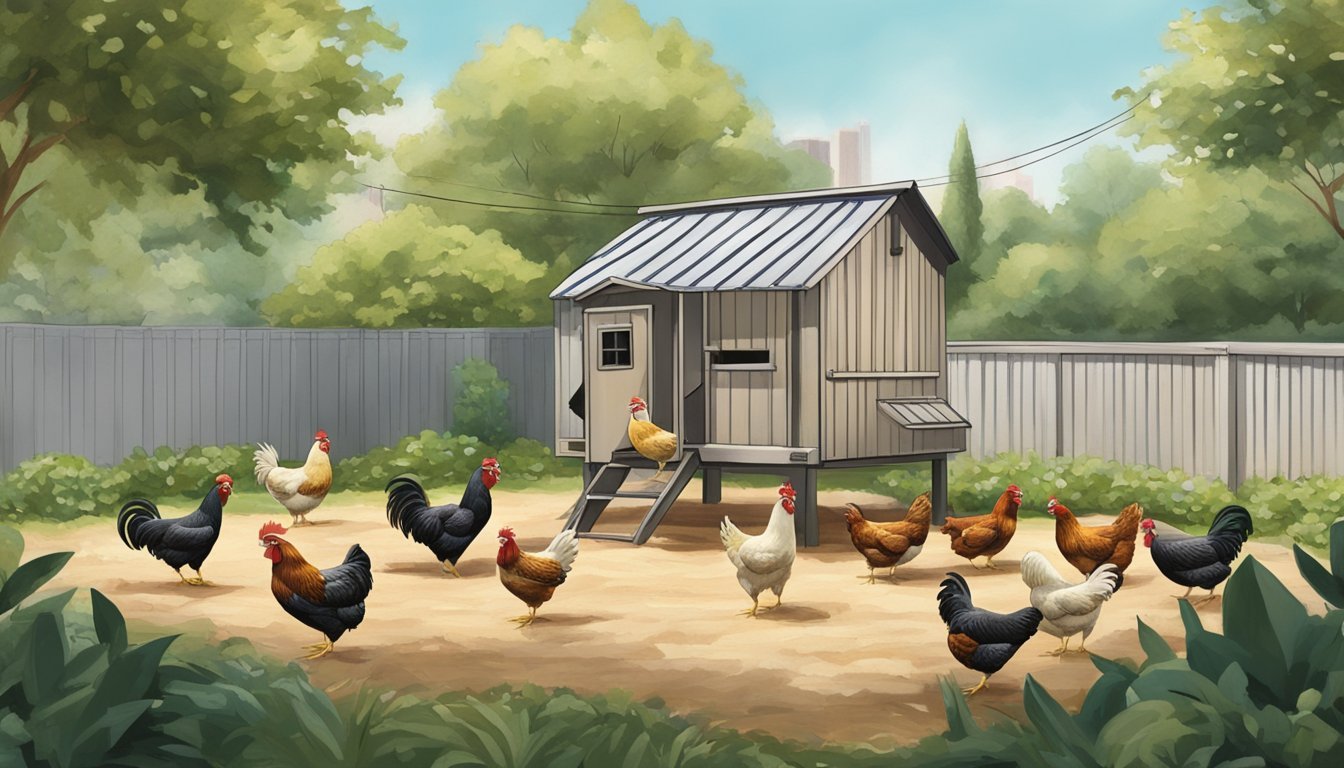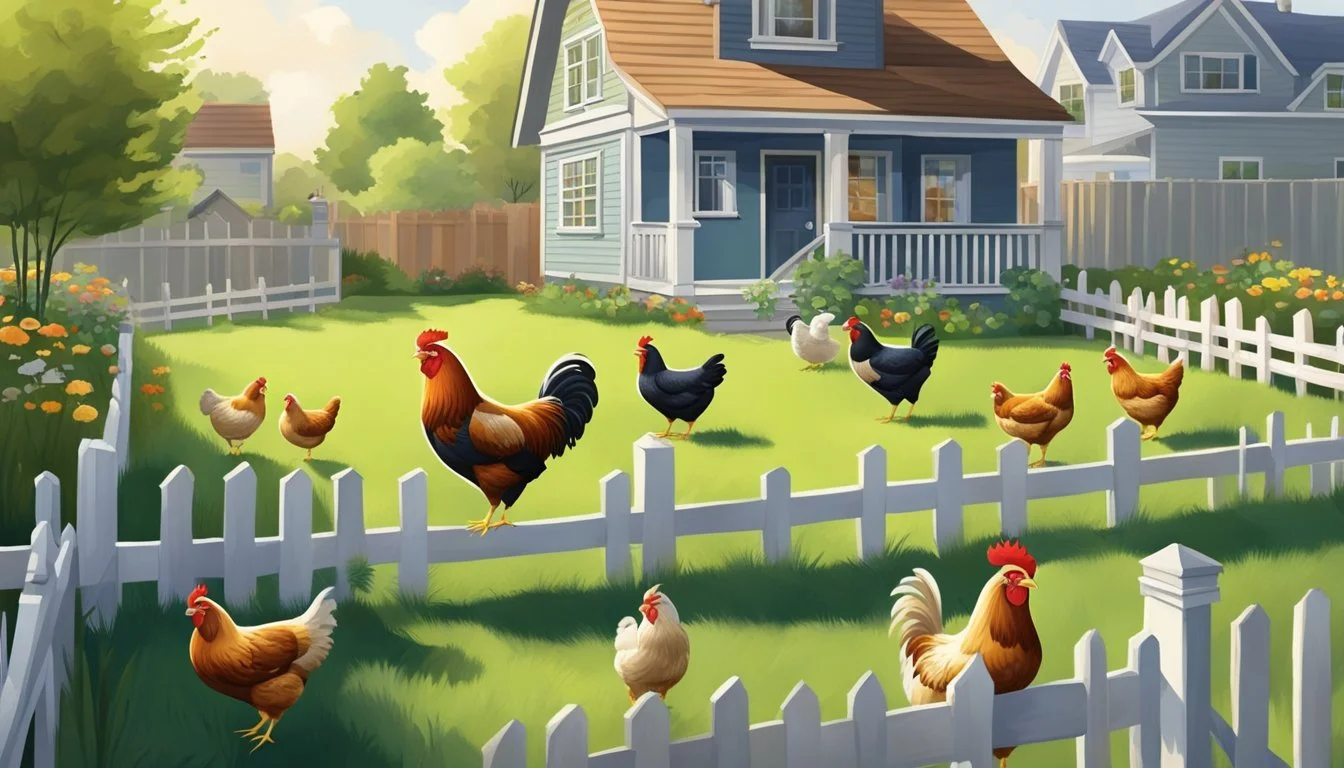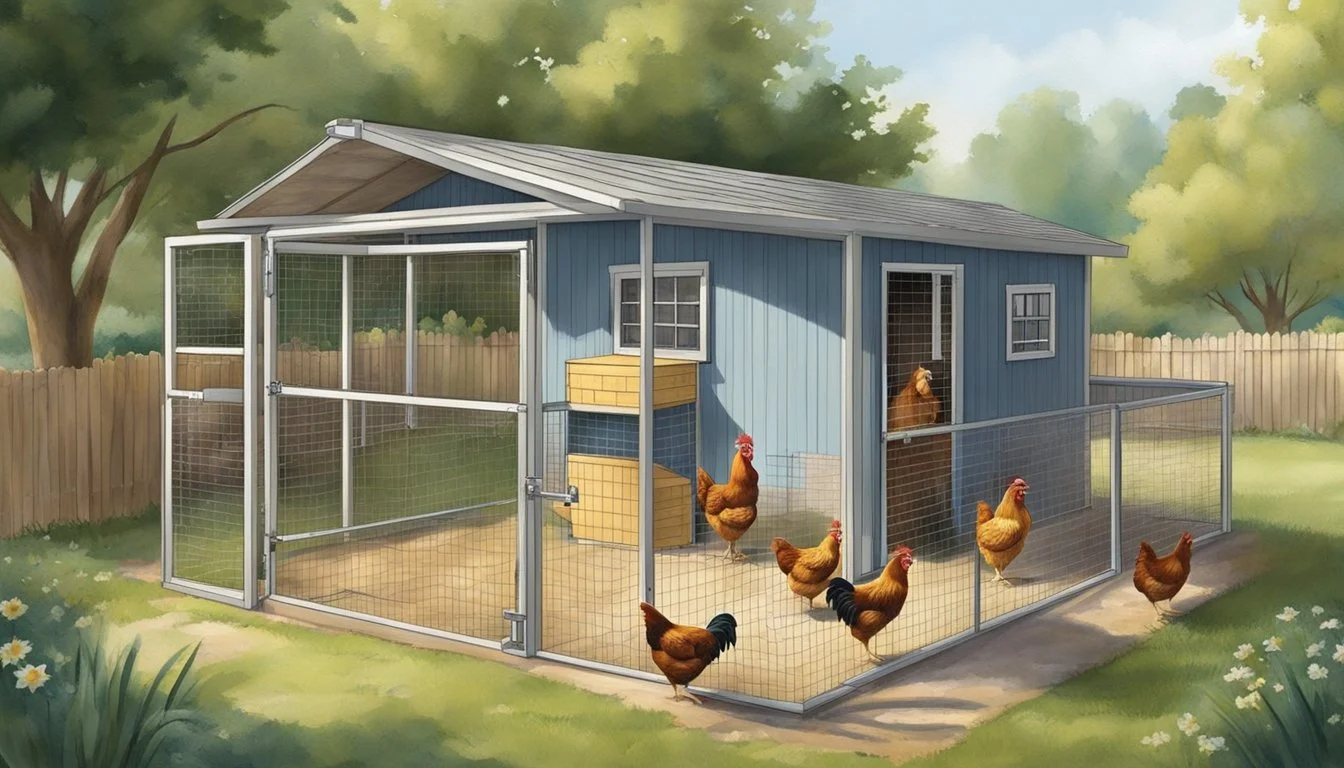Keeping Backyard Chickens in Pasadena, TX
A Practical Guide to Urban Poultry Farming
Raising backyard chickens has become increasingly popular among residents of Pasadena, Texas, echoing a nationwide trend towards more sustainable living practices and a desire for fresh, locally-sourced food. This movement allows for a closer connection to the food source, providing a supply of fresh eggs and, for some, meat, while also contributing to the household's waste management through the chickens' consumption of kitchen scraps.
In Pasadena, the city's ordinances reflect a careful balance between urban living and the keeping of poultry. According to current regulations, any person keeping poultry or fowl must ensure that these animals are housed at least fifty feet away from any residence. This rule is intended to mitigate any potential nuisance to neighbors and to maintain public health standards. The maintenance of premises where fowl are kept is also regulated, ensuring that the conditions are sanitary and do not attract pests.
The city of Pasadena has taken steps to update its ordinances as of November 19, 2019, demonstrating an effort to align with the interests and well-being of both pet owners and the broader community. These regulations are essential for the harmony between urban life and the fulfillment that comes with raising backyard chickens, underscoring Pasadena's commitment to accommodating this aspect of suburban agriculture within its city limits.
Understanding Pasadena's Backyard Chicken Ordinances
Pasadena, TX residents interested in keeping backyard chickens must familiarize themselves with specific city ordinances, permits, and registration processes to comply with local laws.
Legal Requirements for Keeping Chickens
Pasadena mandates adherence to city ordinances that define the legal requirements for keeping backyard chickens. These regulations ensure that chicken keeping is safe, sanitary, and does not disturb the community.
Housing and Space: All chickens must have adequate housing and a certain amount of space.
Maintenance: Owners are responsible for maintaining clean and odor-free conditions to prevent nuisances.
Registration and Permit Process
Obtaining a permit is essential before introducing chickens to your property.
Application: Residents must apply for a permit through the Pasadena city office.
Approval: Permits are granted after ensuring all ordinance criteria are met.
City Ordinances and Property Distance Restrictions
City ordinances in Pasadena dictate specific property distance restrictions concerning backyard chickens.
Restrictions: Chickens must be kept a certain distance from neighboring dwellings.
Previous Ordinance vs. Current: The city code has been updated from the previous ordinance, allowing for closer proximity to property lines while still maintaining neighborly considerations.
Please note that this information is based on regulations as understood at the time of writing and is subject to change.
Chicken Coop Essentials in Pasadena
When keeping backyard chickens in Pasadena, it is essential to ensure that chicken coops are well-designed, secure from predators, and maintained with cleanliness to provide a healthy environment for the chickens.
Coop Design and Construction
A chicken coop in Pasadena must provide ample space for each chicken to live comfortably. Construction guidelines suggest that there should be at least 3-4 square feet of space per bird inside the coop. Ventilation is also critical, as proper airflow helps to minimize odors and maintain a clean environment. Coops should have windows or vents that can be opened or closed depending on the weather.
Protecting Chickens from Predators
Protection from predators such as hawks, coyotes, and raccoons is paramount for backyard chickens. Chicken coops must be constructed with sturdy materials that prevent these predators from gaining access. All openings should be covered with heavy-duty galvanized hardware cloth rather than chicken wire, as it offers better security. Furthermore, coops should be equipped with solid, lockable doors to be closed at night when predators are most active.
Maintaining Cleanliness and Sanitation
Maintaining a sanitary environment inside the chicken coop is crucial for the health of the chickens and odor control. Regularly cleaning the coop and replacing bedding material is necessary. Chicken keepers should use absorbent materials such as straw or wood shavings for bedding, as these materials help to absorb waste and reduce odors. Proper disposal of waste and soiled bedding will help maintain a clean and odor-free coop.
Feeding and Caring for Urban Chickens
Proper nutrition and consistent care are crucial for the health and egg production of backyard chickens in Pasadena, TX. Ensuring chickens have a balanced diet, regular health check-ups, and access to clean water and grit is essential.
Nutrition and Diet
Chickens require a balanced diet to remain healthy and produce a steady supply of eggs. This diet should include:
Starter feed: High in protein, it's essential for chicks up to 6 to 10 weeks old.
Layer feed: Provides the necessary nutrition for hens laying eggs, typically introduced at 18 weeks or when hens begin to lay.
Protein, vitamins, and minerals must be part of their daily intake. Common supplements include:
Calcium: Vital for strong eggshells, often given in the form of crushed oyster shells.
Grit: Helps chickens digest food effectively since they lack teeth.
Feeding schedules and portion control are vital to prevent obesity, which can affect egg production.
Health and Veterinary Care
Regular veterinary check-ups are essential to monitor for common ailments and parasites. Chickens also need vaccinations against prevalent diseases. Some common health practices include:
Parasite control: De-worming and treating for lice and mites.
Disease prevention: Vaccinations and early detection of symptoms signaling illness.
Backyard chicken owners should establish a relationship with a veterinarian who is knowledgeable in poultry care to ensure prompt and accurate treatment if issues arise.
Water Supply and Grit Access
Continuous access to clean, fresh water is necessary for chickens—they can consume a pint or more each day. The water supply should be checked and replenished daily, and containers must be cleaned regularly to prevent the spread of diseases.
Grit is a critical component for digestion in chickens, as it helps grind down food in the gizzard since chickens do not have teeth. The following points outline the importance of grit:
Availability: Grit should always be accessible. Coarseness varies depending on the age and size of the chicken.
Consumption monitoring: Watch for excessive or insufficient grit intake, which can indicate dietary imbalances.
Navigating Neighbors and Community Relations
In Pasadena, TX, residents contemplating backyard chicken keeping must consider their impact on neighbors and ensure adherence to city ordinances to prevent nuisances and avoid fines.
Managing Odors and Noise to Avoid Nuisance
Odor Management:
Routine Clean-Up: Regular removal of waste to prevent odors.
Proper Ventilation: Coops should have adequate airflow to dispel odors.
Noise Control:
No Roosters: Only hens are permitted, as roosters are typically louder and could disturb neighbors.
Considerate Coop Positioning: Place chicken coops away from neighboring residences, schools, and churches to minimize disturbance.
Community Engagement and Legal Compliance
Ordinance Awareness:
Distance Restrictions: Chickens must be kept 50 feet away from property or street lines and 100 feet from any dwelling.
Flock Size: A maximum of ten chickens is allowed per household within the city limits.
Community Relations:
Open Communication: Engage in discussions with neighbors to address concerns proactively.
Legal Responsibilities: Understand and comply with local ordinances to avoid penalties and maintain positive relations within the community.
Activities and Amenities for Backyard Chickens
Ensuring the well-being of backyard chickens in Pasadena, TX, entails providing them with proper exercise, adequate outdoor space, and a comfortable shelter designed to meet their needs.
Exercise and Outdoor Space
Backyard chickens require regular exercise to maintain their health, which can be achieved through adequate space in their outdoor enclosures. Enclosures should be spacious enough to allow chickens to walk, stretch their wings, and engage in natural behaviors like scratching and foraging. A fence or barrier around the area is crucial to keep the chickens safe from predators and prevent them from wandering off.
Run: An enclosed, protected area allowing chickens to exercise and access fresh air.
Outdoor Space: Space should include areas for dust baths and perches of varying heights.
Shelter and Comfort
Chickens need a secure and comfortable coop that provides shelter from the elements and predators. It should be designed to maintain a steady temperature and offer ventilation without causing drafts. The coop must have roosts for sleeping, which simulate the natural instinct to roost in trees, and provide a sense of security.
Coop: Construct with sturdy materials, ensure it's easy to clean, and provide ample space for the number of chickens.
Roosts: Install roosts at an appropriate height, allowing chickens to perch comfortably overnight.
Regulations Specific to Other Fowl and Livestock
Pasadena, Texas, residents interested in keeping fowl or livestock other than chickens must adhere to specific city ordinances that regulate the keeping of these animals.
Keeping Other Types of Fowl
City ordinances dictate that certain types of fowl, such as ducks, geese, and turkeys, are subject to similar regulations as chickens. For example, the Pasadena, Texas Chicken Laws articulate that no person should keep, harbor, or maintain poultry within fifty feet of any residence within the city limits. This includes other types of fowl, as they fall under the broader category of poultry.
Roosters, often considered for their loud crowing, may be restricted entirely or may require additional stipulations such as distance requirements to avoid noise disturbance.
Livestock Ordinances in Pasadena
The regulations for livestock such as horses, sheep, goats, and rabbits are more stringent. The ordinance explicitly makes it unlawful for any person to keep, harbor, or maintain these animals within a certain proximity of residences. Livestock owners should consult the specific distance requirements and permissible number of animals, which may be based on property size.
Beyond city legislations, it is important to note that there are no specific state laws in Texas regulating the keeping of fowl or livestock. Regulations are set by the city or municipality. Owners of cats and dogs are generally subjected to different ordinances that pertain to pets rather than livestock.
In all cases, proper maintenance of the premises where fowl or livestock are kept is crucial to ensure cleanliness and to adhere to health and safety standards.








